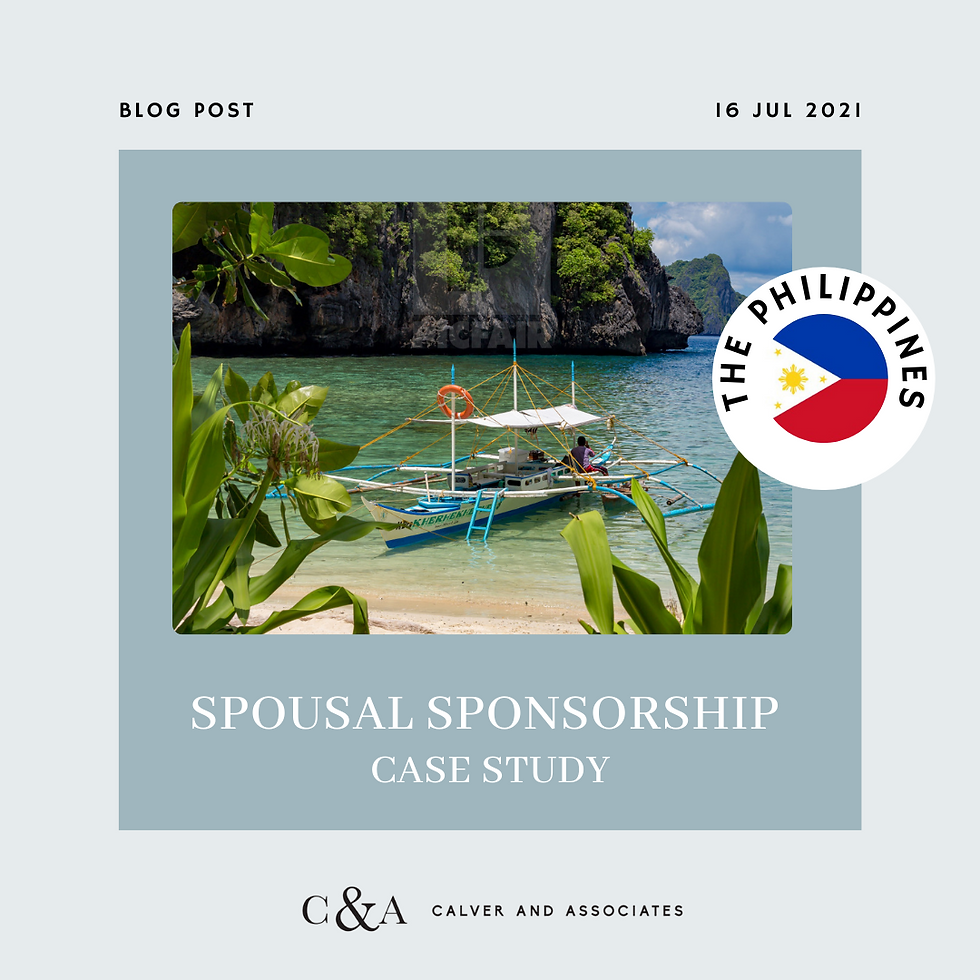WHO CAN SPONSOR A RELATIVE TO CANADA?
- Calver Immigration Consulting Inc.

- Apr 5, 2019
- 3 min read
Updated: May 11, 2020
DETERMINING YOUR ELIGIBILITY
The Government of Canada offers Canadian citizens and permanent residents a number of ways to bring their loved ones from abroad to Canada. One of these ways is through the Family Class sponsorship program. There are a number of sponsorship requirements that both applicants and those being sponsored must meet to be considered eligible for this program.
WHO CAN SPONSOR?
You may be eligible to sponsor certain relatives to immigrate to Canada through the Family Class if you are at least 18 years of age and you are either a Canadian citizen, a person registered in Canada as an Indian under the Canadian Indian Act, or a permanent resident of Canada.
You must also meet set income guidelines and agree in writing to give your financial support to your relative and any other eligible relatives who come with them. The period of financial support would start on the date they become a permanent resident and continue for up to 20 years depending on their age and your relation to them. Further, you must ensure that both you and your relative are able to meet basic needs, which include food, shelter, and clothing. This also means you must be sure that your relative does not need social assistance.
Under most circumstances, you must also live in Canada to sponsor your relatives. If, however, you are a Canadian citizen who lives abroad with plans to return to Canada when your relative(s) immigrate, you may also be eligible. Those who fall into this situation must be sponsoring their spouse or common-law or conjugal partner or dependent children who have no dependent children of their own.
WHO CAN BE SPONSORED?
There are a few different options for who you can sponsor, depending on your circumstances.
You may sponsor orphaned close relatives if they meet all of the required conditions. This means they must be orphaned, be under the age of 18, not married (or in a common-law or conjugal partner relationship), and be related to you by blood or adoption ( e.g. brother, sister, nephew, niece, grandchild, etc.).
You may alternatively choose to sponsor one relative, related by blood or adoption, of any age if you meet all of the following conditions:
You don’t have a living relative you could sponsor instead, such as a:
Spouse
Common-law partner
Son or daughter
Parent
Brother or sister
Uncle or aunt
Nephew or niece
You don’t have any of the above-named relatives who is:
A Canadian citizen
A permanent resident
Registered Indian under the Indian Act
If the relative you want to sponsor has a spouse, partner, or dependent children who will come with them to Canada, you must also include them on the same sponsorship application.
OTHER OPTIONS
You may find that your relative does not qualify for the family sponsorship class under the previously mentioned categories. If this is the case, they may still be able to come to Canada as a skilled immigrant through the Express Entry system. The Express Entry program manages applications for certain economic immigration programs, such as the Federal Skilled Worker Program, Federal Skilled Trades Program, or the Canadian Experience Class.
The Express Entry system selects applicants for their skills, experience, and ability to contribute to Canada’s economy. It is a points-based system whereby applicants with a certain Comprehensive Ranking System (CRS) score will receive a higher chance of being issued an Invitation to Apply (ITA). Points are awarded based on a number of factors such as education, job skills, and language proficiency. The system awards points to some candidates who have family living in Canada.
OTHER BLOG POSTS YOU MAY FIND HELPFUL:
Our Services
Calver and Associates is a leading provider of Canadian Immigration services in Durham Region. We serve clients in Oshawa, Whitby, Ajax, and beyond. Our Registered Canadian Immigration Consultant has over 10 years of experience in Canadian Immigration law and over four years of experience serving those in the Oshawa area.
We can provide assistance with applications for both temporary and permanent residency in Canada. We handle applications for study permits, permanent residency, family class sponsorship, visitor visas, work permits, and Canadian citizenship. We also handle criminal inadmissibility cases by developing remedies for refusal.





Comments